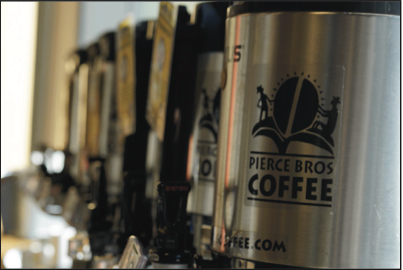
Ever pull an all-nighter to study for an exam, finish an essay, or perfect a project? For many college students, this is not uncommon. Depending on the volume of classwork, jobs, and extracurriculars, the hustle of college life leaves little room for sleep. In the battle against sleep deprivation, many Continentals turn to caffeine.
For some, this habit goes beyond having a cup of coffee with breakfast. On any given evening, Hamilton students can be spotted at Opus Cafe purchasing their strongest coffee. This is because coffee is a source of stamina for students who cannot afford to sleep the recommended amount. This begs the question: is coffee the answer?
Rileigh Arrington
’
21 drinks one-to-two cups of coffee on an average day. On particularly strenuous days, she drinks 3 or more cups to remedy her exhaustion. When she was in high school, all she would drink was half-caff coffee. But, after starting college, she began drinking fully caffeinated coffee.
It is common for regular coffee drinkers to find that they need more coffee to get the same effects. They also may become dependent on the beverage and experience withdrawal symptoms if they do not get their fix. Arrington reported that she experiences “exhaustion and headaches” when she skips coffee for a day.
Since caffeine limits blood flow to the head, it can also be the solution to migraines caused by constricted blood vessels. Arrington, who suffers from chronic migraines, said “sometimes when I have migraines I drink coffee with my medicine because the caffeine helps.”
Unfortunately, the effects of coffee are not all positive. Coffee is found to increase anxiety, which college students already get enough of. Worse yet, it can cause insomnia if used frequently throughout the day. This can create a vicious cycle where people have a bad night of sleep from drinking coffee late into the day. Then, they drink even more coffee to stay awake the following day, and the cycle repeats.
Arrington reported that she gets “six or less” hours of sleep per night on average. According to the National Sleep Foundation, however, the average adult needs at least eight hours of sleep to function. Many of those who cannot reach that amount will use coffee as a substitute. However, this can become a dangerous game depending on when and how often the caffeine is consumed. According to the American Academy of Sleep Medicine, caffeine should not be consumed less than six hours before going to sleep. This only accounts for the half-life of caffeine, which makes it extremely difficult for one to fall asleep. Even after six hours, some caffeine is still present in the body and can prevent REM sleep cycles. This can impede on quality of sleep, which adds insult to injury for sleep deprived college students. So, is coffee the answer?
Occasionally, it can be. On exceptionally demanding days, coffee may not be a bad idea. However, it is probably not smart to consume large quantities of it on an everyday basis. Caffeine is a stimulant, and like most stimulants, it loses its energy-giving effect the more often it is used. In order to preserve coffee’s benefits, it is wise to limit the amount you drink per week. But where does this leave busy college students who cannot get seven hours of sleep per night?
There are more sustainable ways to compensate for a lacking sleep schedule. Do not underestimate midday naps. According to the American Psychological Association, “in a 90 minute nap, you can get the same benefits as an eight-hour period of sleep.” Even brief power-naps significantly enhance one’s ability to focus.
There is a time and a place for coffee. There is nothing wrong with having a small cup to start each day. However, try to save the large Opus Magnums for when they are really needed. Squeezing quick naps between classes may be all that is needed on the average day.

















